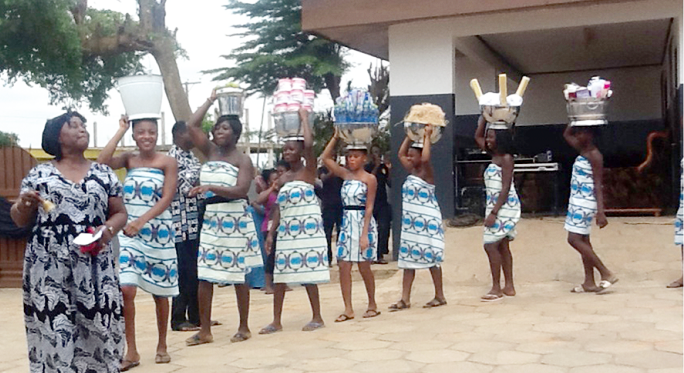
‘From Ghana?’“….Why did Dr Serebuor send you here….?”
I flew to Kumasi on Thursday. My intention was to spend Friday with my relatives. However, on Friday morning, Dick my classmate whose mother’s funeral had taken me to Kumasi asked me to join his family for a traditional ceremony called ADWADEƐ/ADESIEDEƐ.
Here, the children of the deceased and her sons and daughters-in-law were to showcase everything that was required for the burial of the old lady to her family. This ranged from toiletries such as the local sponge, soap, towels, toothbrushes and paste, through underwear and undergarments to the dress/shroud and head gear she would be laid in state with. Finally, the coffin was paraded for inspection. The inspection and acceptance of the items were done by the old lady’s relatives led by the ‘Abusuapanyin’, as the family head is called.
However, before I left home that Friday morning, an interesting incident occurred at breakfast with my host.
Breakfast with Corsay
At breakfast, my host Corsay asked whether I wanted tea or coffee. My rather apologetic and diffident response for coffee, because I was on medication for hypertension, and the feeling of guilt doing what I believed was wrong, elicited an immediate response from him.
Years earlier, my host had had surgery overseas. As part of preparations in the hospital, a battery of surgeons, anesthetists, nutritionists, physiotherapists, nurses etc., came to chat with him the day before the surgery. When later he was brought coffee, he could not believe it.
For years, he had gone off coffee on his doctor’s advice in Ghana because he was hypertensive. Corsay quickly protested to the nurse. The nurse was surprised at my host linking coffee to hypertension and called in the nutritionist! She also called in the doctor who calmly told him coffee did not promote hypertension in any way! With this new information, I drank my coffee very confidently.
Dr Serebour
While being wheeled to the theatre, Corsay was asked by the nurse which country he came from. “Ghana”, he said. “Ghana?” she exclaimed! “Do you know Dr Serebour?” Corsay’s answer was, “Yes, he referred me here.” The nurse stopped the trolley and in disbelief asked Corsay, “Why did Dr Serebour send you here from Ghana? This is a simple procedure for him. He did it many times when he was here with us!” Dr Serebour is the head of the Cardio-Thoracic Centre at the Korle Bu Teaching Hospital.
On his first review at Korle Bu on his return home, Corsay narrated his encounter with the nurse to Dr Serebour. He calmly said, “She is right. It is a simple procedure, but if I had to do it here, I would have had to open your back like chicken to have access to the affected area. Thereafter, managing the wound would itself have presented a challenge. Over there, all they did was a small incision on your groin through which the appropriate gadget was passed. We have the skills to perform the surgery. Unfortunately, we do not have the equipment!”
He added that this partly accounted for the brain drain among doctors and nurses. Such people feel helpless as they watch patients die needlessly because of equipment unavailability. Eventually, frustrated, they leave the country. He continued that for those of them who have chosen to stay, they make do with the available equipment and send important patients overseas for procedures they could easily have done in Ghana if only they had the equipment.
Question
My question is, why do we do this to ourselves? Recently, the first lady of an African country died in a hospital overseas. Meanwhile, a hospital named after her in her country did not have basic items. An angry journalist asked why she chose to fly overseas to die when she could simply have died in the hospital bearing her name in her capital.
A tiny country such as Cuba produces enough doctors to export some to African countries, including Ghana. Apart from not producing enough doctors, we do not provide the few doctors who defy all odds to work in Ghana with the equipment to back their skills. Why do we complain when they leave? In any case, young doctors graduate from medical schools and stay at home for long periods awaiting postings!
To the powers that be, how would you have answered the question the nurse asked my host…..“From Ghana? Why did Dr Serebour send you here?”
Leaders solve problems!
As a young cadet, I was taught that leaders are paid to solve problems, not to explain why problems cannot be solved. Leaders, please solve Ghana’s problems, including giving doctors and nurses the equipment to work with so they can save the vast majority of us who cannot be flown overseas for medical care from needless and avoidable deaths!
